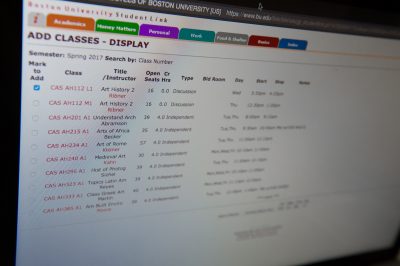
For Boston University students who wish to explore courses outside of their major, starting Jan. 1, 2017, a new university policy will allow them to elect up to eight credits of academic coursework on a “pass or fail” basis if they are in good academic standing.
Students must elect the courses they wish to be graded as pass/fail before the university’s drop date, according to the university policy released Wednesday. If the student receives a D or above in a class they have designated to be a pass/fail course, they automatically pass the course, and the grade will not be included in their GPA, according to the policy.
BU Faculty Council Chair J. Robb Dixon said that the policy, which cannot be applied to courses for general education, writing, language, major or minor requirements, intends to ease students’ stress about their GPAs while enrolled in classes that are not on their graduation track.
“[The policy] is supposed to give people the confidence that they would not risk their GPA in taking a course that they might be curious about, but wasn’t in their major field of study,” Dixon said.
Individual schools and colleges within the university have already designated specific courses to be pass/fail, including internships and PDP courses, Dixon said. The Faculty Council endorsed the decision to expand this policy to allow students to take some academic coursework in a similar fashion, Dixon said.
Dixon said that this policy is especially important to him because he shared a similar experience when he took several classes outside of his major degree path while studying biology at Wesleyan University.
“The two courses that had the greatest value for me were art history and history of music, but they didn’t do my GPA all that much good,” Dixon said. “If this change in the pass/fail policy will actually get people to take some courses they weren’t going to take otherwise, then it’s great.”
Some students, such as Adam Sheikali, a junior in the College of Arts and Sciences, said the new policy will ease students’ stress of maintaining a good GPA.
“I can get behind a pass/fail system because it would allow some students to pay more attention to classes,” Sheikali said. “I want to go to med school, so GPA is really important to me. If I can take some courses without worrying about grades, [my GPA] would probably go up and I would probably be way less stressed.”
Sarah Khan, a sophomore in the Questrom School of Business, said this policy will enable more students to expand their class schedules and be able to take full advantage of the classes BU has to offer.
“This is great if people [who] are in really hard majors and don’t want something to count towards their grade, but they really want to take other electives like art history,” Khan said.
Sasha Boussina, a Questrom sophomore, said he hopes the policy will make it easier for students to pursue classes outside of their major.
“Now students can expand on their interests and ideas that may not align with their degree path,” Boussina said. “Especially in Questrom, the huge workload makes it hard to take electives because it doesn’t make sense to take a sociology class if you have four hard business classes to manage. This policy will hopefully change that.”























































































































